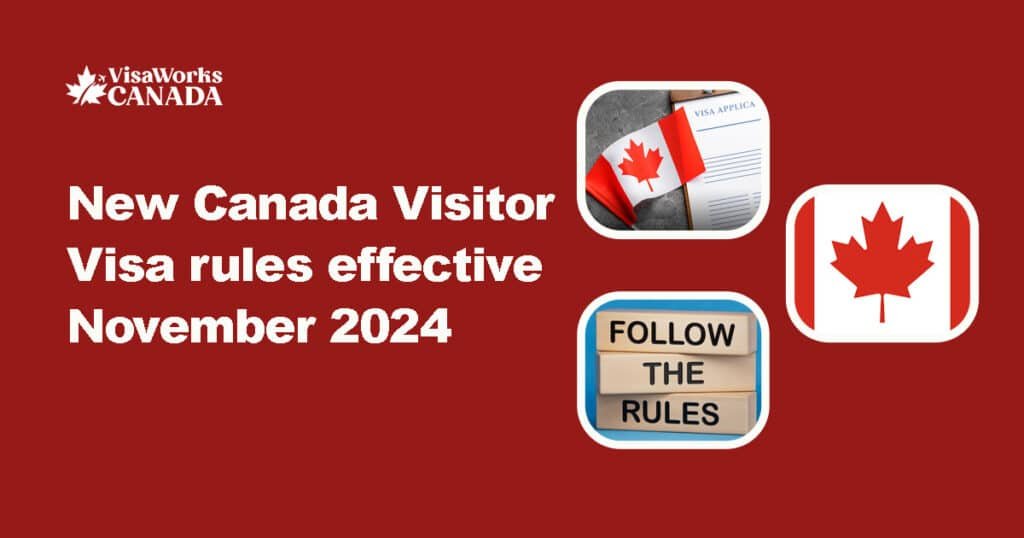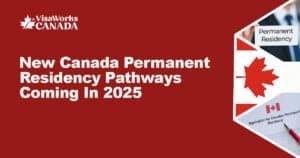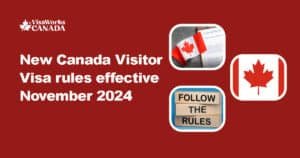The Government of Canada has introduced important changes to its visitor visa policies, effective November 2024. These updates affect international travelers applying for single-entry and multiple-entry visas, giving immigration officers more discretion in assessing each applicant’s unique situation. This shift means that decisions on visa type and duration will be more personalized, based on factors like the purpose of the visit, financial stability, and medical conditions. Here’s everything you need to know about Canada’s updated visitor visa guidelines and what it could mean for your application.
Table of Contents
ToggleMultiple-Entry vs. Single-Entry Visas: What’s the Difference?
Under the new policy, Canadian immigration officers will now have greater flexibility when deciding between issuing single-entry and multiple-entry visas. Here’s a breakdown of each visa type to help you understand which one might be most suitable for your needs.
1. Multiple-Entry Visa
A multiple-entry visa allows holders to travel to Canada from any country multiple times during its validity period. This visa can be valid for up to 10 years or until the applicant’s passport expires, whichever comes first. Travelers can even use an expired passport if they carry both the expired and a current valid passport when entering Canada. This visa is typically ideal for those who expect to make frequent trips to Canada, such as visiting family or conducting business.
2. Single-Entry Visa
A single-entry visa permits only one entry into Canada. Once the traveler leaves the country, they must apply for a new visa to re-enter. This type of visa is often issued for applicants attending a one-time event, such as a conference, training session, or tourism visit, where additional travel isn’t anticipated. Officers now have the freedom to issue either visa based on their assessment of the applicant’s needs and circumstances.
Guidelines for Issuing Single or Multiple-Entry Visas
Canadian immigration officers will take a closer look at each applicant’s situation to determine which visa type is more appropriate. This process involves a careful examination of specific factors to ensure the chosen visa aligns with the applicant’s travel plans.
1. Purpose of Visit
Officers will consider whether the applicant’s visit has a specific or recurring purpose. For example, single-entry visas may be issued for one-time events, while multiple-entry visas could be given to those with close family in Canada, making frequent visits necessary. Special cases, such as compassionate travel, may also receive customized treatment, considering the applicant’s anticipated needs.
2. Financial Stability
An applicant’s financial background plays a significant role in the decision-making process. Those with a stable financial situation may qualify for multiple-entry visas, as they’re more likely to afford multiple trips. In cases where a Canadian host will cover expenses, officers will review the host’s financial standing as well. Additionally, if an employer sponsors the trip, official documentation verifying financial backing may be required.
3. Medical Considerations
Health factors can influence visa type and validity as well. For instance, if an applicant has a health condition requiring future treatment, a shorter-term or single-entry visa may be more suitable. Applicants coming to Canada for medical reasons must also provide proof of health insurance or a financial plan to manage potential healthcare expenses.
4. Additional Factors
Ties to the applicant’s home country, including employment and family obligations, can impact the decision. A strong travel history, including compliance with prior Canadian visa conditions, may favor a multiple-entry visa. Conversely, a history of visa refusals, whether in Canada or other countries, could lead officers to consider a single-entry visa.
Determining the Visa Validity Period
Canada’s immigration officers now have more flexibility to assign visas with shorter validity periods based on an applicant’s individual circumstances. This shift away from the automatic issuance of 10-year visas means that officers will evaluate each case more precisely.
1. Purpose of Visit Duration
For applicants visiting for a short-term purpose, like fulfilling a business agreement, the visa might only cover the necessary duration. This approach helps align the visa validity with the applicant’s specific plans and prevents unnecessary long-term visas.
2. Country of Residence and Stability
The applicant’s country of residence and its current political or economic stability could influence the visa duration. If the country has a history of instability, officers may issue a shorter validity visa, ensuring a more appropriate match to the applicant’s home environment.
3. Evolving Ties
Changes in an applicant’s ties to Canada or their home country can also impact the visa’s duration. For example, if officers anticipate weakened ties over time, they may issue a visa with a shorter validity period.
Implications of the New Visa Guidelines for Applicants
These new visa guidelines enable a more tailored approach to applications, offering unique advantages while introducing more scrutiny to the process.
1. Purpose of Visit and Duration Alignment
Applicants can expect decisions that align closely with their visit intentions. For compassionate or single-purpose travel, officers may issue shorter validity visas or single-entry options. From expert visa services to comprehensive guidance on permanent residency, study visas, and business ventures in Canada, VisaWorks Canada Ltd. is here to help you navigate every step of your journey. Contact us now for personalized assistance.
2. Enhanced Scrutiny and Documentation Requirements
The updated guidelines may require applicants to present stronger evidence to justify a multiple-entry visa. This could include proof of finances, family ties, and reasons for repeated visits. Enhanced scrutiny ensures that visa issuance closely matches the applicant’s genuine intent and circumstances.
3. Potential for Shorter Validity
With the shift towards individually tailored visas, some multiple-entry visas may be issued with shorter validity than the previous 10-year standard. This adjustment better reflects an applicant’s needs and helps ensure that the visa duration aligns with travel purposes.
4. Personalized Assessments
Each application is now subject to a personalized review, with visa officers considering the applicant’s unique background and travel goals. This change means applicants may experience outcomes more suited to their specific situations, reflecting a nuanced approach to Canada’s immigration policy.
Frequently Asked Questions (FAQs)
1. What is the difference between single-entry and multiple-entry visas?
A single-entry visa allows one-time entry into Canada, while a multiple-entry visa lets you enter Canada multiple times until it expires.
2. How long can a multiple-entry visa last?
Typically, it lasts up to 10 years or until the applicant’s passport expires, whichever is sooner. However, shorter durations are now possible under the new guidelines.
3. Can I use a Canadian visa on an expired passport?
Yes, you can use a valid Canadian visa on an expired passport as long as you bring both the expired and a current passport when entering Canada.
4. How do officers decide between a single and multiple-entry visa?
Officers consider factors like purpose of visit, financial stability, ties to the home country, medical needs, and travel history to decide the visa type.
5. How can VisaWorks Canada Ltd. help with my visitor visa application?
VisaWorks Canada Ltd. provides expert guidance on Canadian visas, permanent residency, study permits, and more. Contact us for personalized assistance tailored to your needs.
Stay informed and updated on all your visa needs with VisaWorks Canada Ltd. Our experienced team is ready to support your journey to Canada, whether you’re planning a short visit or a longer stay.








